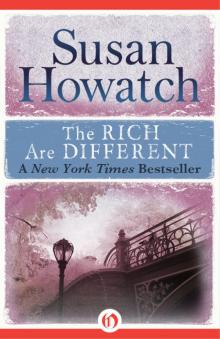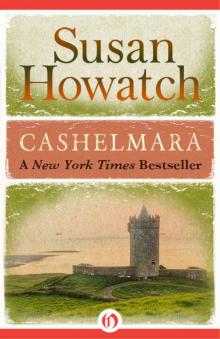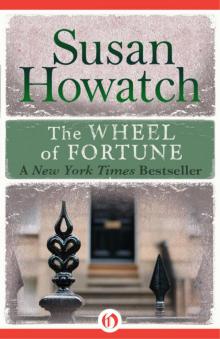- Home
- Susan Howatch
Sins of the Fathers
Sins of the Fathers Read online
Sins of the Fathers
Susan Howatch
Contents
PART ONE Sam: 1949
Chapter One
I
II
III
Chapter Two
I
II
III
Chapter Three
I
II
III
IV
V
Chapter Four
I
II
III
IV
V
VI
VII
VIII
Chapter Five
I
II
III
IV
V
VI
Chapter Six
I
II
III
IV
V
VI
PART TWO Alicia: 1949
Chapter One
I
II
III
IV
Chapter Two
I
II
III
IV
V
VI
Chapter Three
I
II
III
IV
V
Chapter Four
I
II
III
IV
V
VI
PART THREE Cornelius: 1950–1958
Chapter One
I
II
III
IV
V
VI
Chapter Two
I
II
III
IV
V
Chapter Three
I
II
III
Chapter Four
I
II
III
IV
V
VI
VII
VIII
Chapter Five
I
II
III
IV
V
Chapter Six
I
II
III
IV
V
VI
Chapter Seven
I
II
III
IV
V
PART FOUR Sebastian: 1958–1960
PART FIVE Scott: 1960–1963
Chapter One
I
II
III
IV
V
VI
Chapter Two
I
II
III
IV
V
VI
VII
VIII
IX
Chapter Three
I
II
III
IV
V
VI
VII
VIII
IX
X
Chapter Four
I
II
III
IV
Chapter Five
I
II
III
IV
V
Chapter Six
I
II
III
IV
V
VI
Chapter Seven
I
II
III
IV
V
PART SIX Vicky 1963–1967
Chapter One
I
II
III
IV
V
VI
Chapter Two
I
II
III
IV
V
VI
VII
VIII
IX
X
XI
XII
XIII
XIV
XV
Chapter Three
I
II
III
IV
V
VI
VII
VIII
IX
X
XI
Chapter Four
I
II
III
IV
V
VI
Chapter Five
I
II
III
IV
V
VI
VII
VIII
IX
X
XI
XII
Chapter Six
I
II
III
IV
V
VI
VII
VIII
IX
X
XI
Chapter Seven
I
II
III
IV
V
VI
VII
VIII
IX
X
A Biography of Susan Howatch
PART ONE
SAM: 1949
Chapter One
I
SOON AFTER MY RETURN from Germany in that troubled spring of 1949, my boss asked me if I would marry his daughter. It was, as I at once realized, a unique occasion. Although I was approaching middle age and not unsophisticated, I had never before been proposed to by the father of a would-be bride without either her knowledge or her consent.
“Well?” said Cornelius encouragingly before my speechlessness could become an embarrassment to us both. “What do you say?”
I knew exactly what I wanted to say. The Germans had a phrase for it. “Ohne mich,” I had heard them say again and again during my recent trip. “Count me out.” And those terse words had soon symbolized to me all the exhaustion and disillusionment of postwar Europe.
“Ohne mich!” I now responded automatically, too appalled to be diplomatic, but luckily Cornelius knew no German. As he looked blank it occurred to me that I had just bought myself a few precious extra seconds and I at once used the time to pull myself together. As soon as he had said coldly, “Pardon me?” I replied without hesitation, “That means ‘What a happy suggestion!’ ” and gave him my warmest smile. The twenty-three years I had spent working as an investment banker on Wall Street had perhaps overdeveloped my talent for survival.
We were sitting in his office at the bank, and beyond the French doors the sunlight of early evening slanted across the patio. The bank, a huge Renaissance-style relic of the nineteenth century, stood at One Willow Street on the corner of Wall, but the senior partner’s office at the back of the building might have been a hundred miles from the noisy streets of downtown Manhattan. In the patio the magnolia tree was in full bloom, reminding me of summers irretrievably lost, the summers in Maine on the estate where my father had been the head gardener, the summers in Germany in those sunlit days before the war. The beauty of the magnolia blossom suddenly seemed unendurable; I had to avert my eyes. But when I glanced around the room I saw the bleak furniture, the violent primary colors in the painting above the fireplace and, beyond his desk, the anxious little man who occupied the senior partner’s chair.
“You’ll do it, Sam?” He seemed about to collapse with relief. “You’ll fix it?”
I thought of all the times he had asked me those questions in the past, and when I glanced past him again into the patio I saw not the magnolia tree but the high wall black with city filth and the doorway, long since bri
cked up, which had once led into Willow Alley.
“Now, wait a minute!” I protested, laughing. “Don’t rush me—this is a big occasion! It’s not every day a hardened bachelor of forty-one receives such an unexpected proposal from his boss!”
“Sam, I know—I just know—that this is the only solution to the problem—”
“And don’t think I don’t understand your problem and sympathize with you. It must be harrowing in the extreme to have an eighteen-year-old daughter who’s just tried to elope with a beachboy. However, as one of your oldest friends and certainly your most loyal partner, I owe it to you to point out that I may not be the best candidate for the role of son-in-law. Of course I appreciate the big compliment you’re paying me—”
“Oh, for Christ’s sake!” said Cornelius, exasperated. “Let’s be honest about this! What does a man do when he has a beautiful daughter who’s heiress to a fortune? If he’s got any grain of moral responsibility he marries her off to someone he can trust before some goddamned gigolo can ruin her life!”
“Yes, but—”
“The trouble is, there are very few people I trust; in fact, the only people I trust one hundred percent today are my three friends who knew me back in the days before Paul left me all his money. And since Jake’s married and Kevin’s queer, that leaves you. Goddamn it, Sam, I can’t think why you’re dragging your feet about this! You’ve been saying for years that you wanted to get married, and you know very well that I’d make this marriage worth your while in more ways than one. What’s your problem, for Christ’s sake?”
There were several replies I could have made, but any attempt to be honest would only have had the effect of prolonging the conversation and I could now see the conversation had to be terminated immediately. Cornelius needed time to calm down. Clearly Vicky’s escapade with the beachboy had propelled him into a big panic, but if I gave him the chance to recover his equilibrium he would soon realize his wild matrimonial pipe dream was best forgotten. Clearing my throat, I reluctantly prepared to abandon the truth and lie my way out of trouble.
“There’s no problem,” I said soothingly. “I’m not a man to miss my opportunities, but give me a couple of days to adjust to the idea, won’t you? I’m a human being, not a robot programmed to give the correct response whenever someone presses a button!”
“Why, Sam, I’d never think of you as a robot, you know that—and I hope you’d never think of me as a mad scientist bent on pressing all the wrong buttons!” He gave me one of his most attractive smiles, the boyish one which made him look so innocent, and raising nimbly to his feet, he held out his hand. His gray eyes were brilliant with affection. “Thanks a million, Sam,” he said. “I knew you wouldn’t let me down.”
Before we could shake hands, the white telephone rang on his desk to indicate a call coming through on his private line. “That’ll be Alicia,” said Cornelius, immediately tense again. “She said she’d let me know if the trays of food left outside Vicky’s door had been touched. If you’ll excuse me, Sam …”
I escaped.
II
It’s not easy to work for someone the same age as oneself. Nor is it easy to work for one’s closest friend, particularly when the friendship has spanned twenty-four years. Cornelius and I, both forty-one, had first met when we were boys of seventeen in 1925, but despite the fact that our work created a common bond, the bank paradoxically both united and divided us. It compelled us to share huge segments of our lives, yet since Cornelius was the boss, the sharing was never on equal terms. I respected Cornelius and we got along well, but sometimes (since I was only human) I couldn’t help resenting my subordinate position, and I had never resented it more than I did that evening when he tried to push me into marrying his daughter.
It was Cornelius’ uncle, Paul Van Zale, who had first brought us together. Immensely rich, immensely powerful, with his own Wall Street investment bank, his beautiful showpiece wife, and his mansions on Fifth Avenue in New York and at the summer resort of Bar Harbor in Maine, Paul had a profound influence on me when I was growing up. I was the son of German immigrants; my parents, working as gardener and housekeeper, took care of Paul’s summer home for him in the long intervals between his visits, and since I was only his servants’ son, I hardly expected him to pay any attention to me when he came to Bar Harbor on vacation. However, when I was seventeen he invited me to live as a guest in his home in order to be one of the three companions he was seeking for his great-nephew who was due to visit him that summer from Ohio. Cornelius was Paul’s only male relative. Having no sons of his own, Paul had decided it was time to discover if his great-nephew was tough enough to sustain the burden of the Van Zale fortune and eventually succeed him at the bank.
At first I didn’t know what to make of Cornelius. I didn’t know what to make of the two other boys either. Paul seemed to have selected an odd quartet of protégés, and although we were all the same age, seventeen, we appeared to have nothing else in common. Kevin Daly was the son of a rich Irish-American politician and attended a famous Eastern Seaboard education establishment a world removed from the high school I attended at Bar Harbor; Jake Reischman came from New York’s German-Jewish aristocracy and lived in a Fifth Avenue palace which I, brought up in the lodge at the gates of the Van Zale estate, could hardly begin to imagine. Kevin seemed overpoweringly extroverted and self-confident; Jake seemed incredibly debonair and sophisticated. I felt very conscious of my social inferiority in their presence, and had it not been for the fact that Cornelius was even more overwhelmed by them than I was, I might well have flunked the golden opportunity for advancement which Paul was offering me, and retreated in despair to the lodge.
However, Paul soon bound us together. At the end of that summer we were all united in our hero worship of him and unanimous in our desire to be as dazzlingly successful in life as he was, and when he recalled us in 1926 for a second summer as his special protégés; we were all excited by the prospect of our reunion.
But our reunion was short-lived. Paul was killed soon afterward. In those days wealthy men in his position were so vulnerable to assassination by Bolshevist fanatics that he had always employed a bodyguard, but the men who conspired to murder him were sophisticated enough to overcome this routine precaution against disaster. The world, stunned by his death, was stunned too by his will; Paul had named Cornelius as his heir. This was the first public indication Paul had given that he considered his great-nephew tough enough to take on such a considerable responsibility, and as time passed everyone slowly realized that his confidence hadn’t been misplaced.
Cornelius had delicate health and a frail appearance. At the age of eighteen he also had a face like a choirboy’s, a respectful way of talking to his elders, and a smile which apparently gave women an irresistible desire to mother him. No one could have looked more harmless, and no one, as Paul once remarked dryly, could have been more adept at employing that vampire’s trick of going straight for the jugular vein.
It took Cornelius some years to establish himself as senior partner at the bank, but by the time he was thirty his life was mirroring Paul’s with uncanny precision. He had his Wall Street bank, his showpiece wife, his mansions on Fifth Avenue and at Bar Harbor; he had all Paul’s wealth and success and fame.
I wasn’t doing so badly myself. After Paul had died in 1926 I went to New York because Cornelius, always a realist, had known he would soon need a loyal ally, while I, always an opportunist, was determined not to pass up the chance to fulfill my classic American dream of achieving wealth and success. Of course none of the Van Zale partners had taken us seriously. They had thought we were just a couple of schoolboys playing at being bankers, and so they had laughed, writing us off by assuming our dreams were inevitably doomed to failure.
I often thought of those men at the bank who had laughed at us back in 1926.
They were all dead now.
When we had first begun to work at the bank, the most powerful man on the premises had be
en Paul’s favorite partner, Steven Sullivan, a man some twenty years older than Cornelius and myself. Huge, shrewd, flamboyant, Steve had at first terrified us both, yet right from the start we had both known this was the one man we had to oust from the bank if Cornelius were ever to sit in that coveted senior partner’s chair.
“Of course it’ll be difficult to eliminate him,” Cornelius had said, summoning all his talent for long-range planning, “but there’s no reason why we shouldn’t fix the elimination in the end. Where there’s a will there’s a way.”
We fixed it. We ousted him. Later he died. We were indirectly responsible for his death too, although Cornelius would never admit it, saying it was hardly our fault that Steve had driven his car into a tree after drinking the contents of a bottle of Scotch. Cornelius never admitted anything was his fault. He always just said: “I was driven to do what I had to do,” and then he would start talking about something else. He seemed to have an inexhaustible talent for shutting out the past he had no wish to remember, and it was a talent I often envied, for it would have been such a relief if I could have walled off not only my guilt about Steve Sullivan but my guilt about being a German-American who hadn’t fought in the war.
I had only just returned from my first postwar vacation in Germany. I had been thinking of it ever since I had arrived back in New York, and I knew the memories would continue to haunt me with unbearable clarity: the ruined cities, the terrible peace of the shattered countryside, the Allied soldiers laughing in the streets—and finally the G.I. at my side who had whistled “Lili Marlene.”
It occurred to me, as I escaped from the senior partner’s office on that April evening in 1949, that when compared with the nightmare of my German vacation Cornelius’ idiotic suggestion that I should marry his daughter could almost be classed as a joke. However, my moment of humor was short-lived. My position was potentially too awkward, and as I ran up the stairs from the back lobby I knew I was breathing hard not only from the sudden exertion but from my extreme tension as well.
I entered my office. On my desk I found a pile of letters awaiting signature, six pink notes recording telephone messages, and a long memo from my personal assistant, but I ignored them all, fixed myself a double Beefeater martini on the rocks, and reached for the phone.
The bell rang eight times before Teresa picked up the receiver.
“Hi,” I said, “it’s me. Are you busy?”
“I’m cooking jambalaya for Kevin’s dinner and wondering if he’ll ever have the nerve to eat it. How are you?”
“Just fine. Can I see you tonight?”
“Well …”
“I lied. I feel terrible. How about a quick drink? I’ll sit in the kitchen while you cook.”

 The Dark Shore
The Dark Shore Sins of the Fathers
Sins of the Fathers The Rich Are Different
The Rich Are Different The Shrouded Walls
The Shrouded Walls The Heartbreaker
The Heartbreaker Cashelmara
Cashelmara The Wonder Worker
The Wonder Worker The Wheel of Fortune
The Wheel of Fortune Ultimate Prizes
Ultimate Prizes Penmarric
Penmarric The High Flyer
The High Flyer